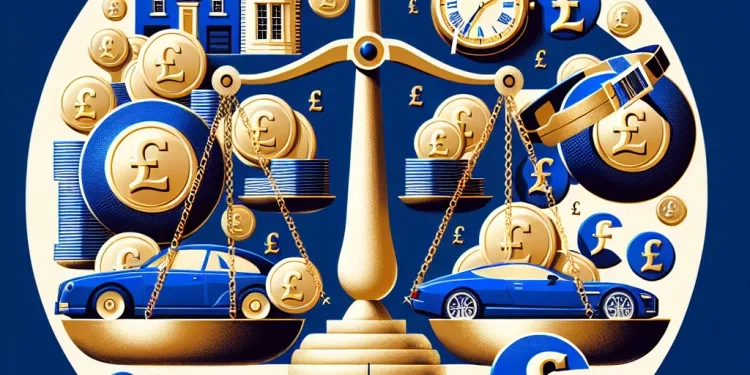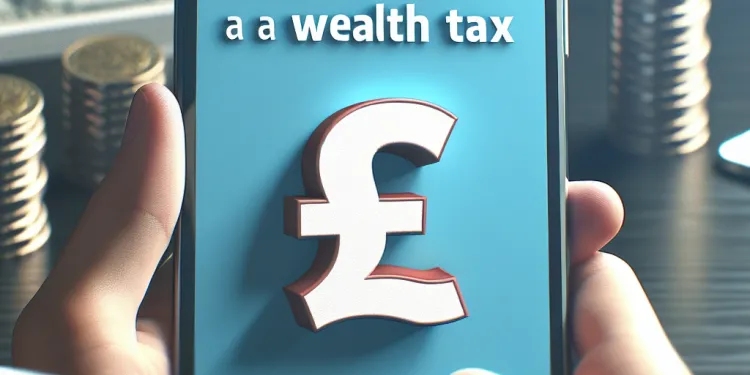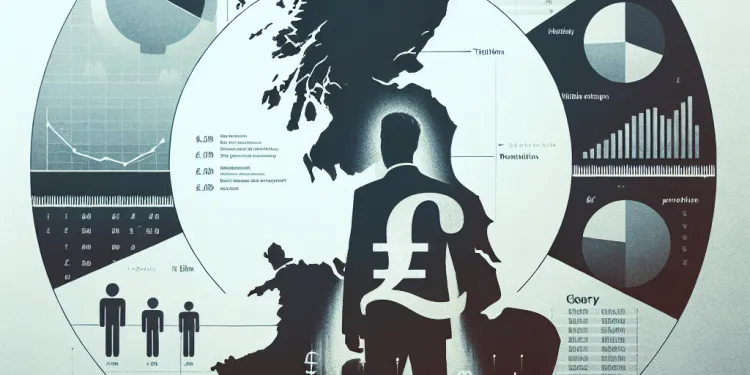
Find Help
More Items From Ergsy search
-

How do economists view the impact of wealth taxes?
Relevance: 100%
-

How might a wealth tax impact inequality in the UK?
Relevance: 66%
-

Can a wealth tax impact economic behavior?
Relevance: 63%
-

What is the Wealth Tax in the UK?
Relevance: 59%
-

What is a Wealth Tax?
Relevance: 59%
-

Could a wealth tax affect economic growth in the UK?
Relevance: 55%
-

Can a wealth tax be levied annually?
Relevance: 55%
-

What arguments are made for a wealth tax in the UK?
Relevance: 55%
-

Has the UK ever had a wealth tax?
Relevance: 55%
-

What is the wealth tax in the UK?
Relevance: 53%
-

What is the objective of a wealth tax?
Relevance: 52%
-

Could a wealth tax encourage tax avoidance?
Relevance: 50%
-

What are the challenges of implementing a wealth tax?
Relevance: 50%
-

Would a wealth tax replace other taxes in the UK?
Relevance: 50%
-

Why doesn't the UK have a wealth tax?
Relevance: 50%
-

Has any political party in the UK supported a wealth tax?
Relevance: 49%
-

Who is typically subject to a wealth tax?
Relevance: 49%
-

How is a wealth tax typically calculated?
Relevance: 49%
-

How does a wealth tax differ from an income tax?
Relevance: 49%
-

How do other countries implement a wealth tax?
Relevance: 48%
-

How might a wealth tax affect wealthy individuals?
Relevance: 48%
-

What are the administrative costs of a wealth tax?
Relevance: 47%
-

Is real estate included in wealth tax calculations?
Relevance: 47%
-

What are common arguments in favor of a wealth tax?
Relevance: 47%
-

Would a wealth tax apply to foreign assets?
Relevance: 47%
-

Are there any countries currently implementing a wealth tax?
Relevance: 46%
-

How do governments ensure compliance with wealth tax laws?
Relevance: 46%
-

How does council tax relate to wealth in the UK?
Relevance: 43%
-

Has the idea of a wealth tax been discussed in political debates?
Relevance: 36%
-

What taxes in the UK target wealth?
Relevance: 36%
-

What are common criticisms of a wealth tax?
Relevance: 35%
-

Do wealth taxes differ between countries?
Relevance: 34%
-

Are there alternatives to a wealth tax for addressing inequality?
Relevance: 33%
-

What exemptions are commonly associated with wealth taxes?
Relevance: 33%
-

Do public opinion polls support a wealth tax in the UK?
Relevance: 33%
-

What types of assets are typically subject to a wealth tax?
Relevance: 31%
-

Could there be a reduction in the basic rate of income tax by 2026?
Relevance: 28%
-

What impact has the sugar tax had on obesity rates?
Relevance: 28%
-

Is there a proposal for a wealth tax in the UK?
Relevance: 25%
-

Are there professional advisors for inheritance tax planning?
Relevance: 25%
Understanding Wealth Taxes
Wealth taxes are levies on the net worth of individuals, which include assets like real estate, stocks, and other forms of personal capital. Economists analyze the impact of wealth taxes by considering their effects on economic behavior, government revenue, and societal inequality. The debate on wealth taxes is complex, as they can generate significant governmental revenue but may also lead to potential distortions in economic activity.
Revenue Generation and Redistribution
One primary argument in favor of wealth taxes is their potential to generate substantial revenue for the government. Economists posit that, when effectively implemented, wealth taxes can provide additional resources for public investment. This revenue can be crucial for funding social programs, education, healthcare, and infrastructure. Moreover, wealth taxes are seen as tools for redistribution, potentially reducing inequality by taxing the wealthiest individuals to fund public services that predominantly benefit the less well-off.
Economic Distortions and Behavioral Responses
While wealth taxes can contribute to government budgets, economists also point out several potential downsides. One concern is that wealth taxes might distort economic behavior. High earners might shift their assets abroad to avoid taxation, potentially leading to capital flight. This offshoring of wealth can negatively impact domestic investments and diminish the taxable base. Economists are keenly aware that such taxes could also discourage savings and investment, important components for economic growth.
Impact on Inequality
Inequality is a significant concern in modern economies, and wealth taxes are often proposed as solutions to this issue. Economists recognize that a well-designed wealth tax could help narrow the wealth gap by redistributing resources more equitably. However, the effectiveness of wealth taxes in achieving this goal is debated. Some economists argue that the real challenge is designing a wealth tax system that can be effectively enforced and does not incur excessive administrative costs.
Concerns About Implementation
Implementing a wealth tax involves overcoming various administrative and practical challenges. Economists highlight the difficulty in valuing assets accurately and the potential costs of administration and compliance. Ensuring fairness and effectiveness in the application of wealth taxes requires significant government resources and sound policy design. Many economists advocate for a comprehensive approach that includes both wealth taxes and other forms of taxation to effectively address inequality while minimizing economic distortions.
Conclusion
The impact of wealth taxes is a complex subject within the field of economics. Economists in the UK and globally offer diverse opinions on their effectiveness and consequences. While wealth taxes present opportunities for revenue generation and reducing inequality, their design and implementation raise important challenges that need careful consideration. A balanced approach that includes multiple policy tools is likely the most effective way to address the societal issues related to wealth distribution.
Understanding Wealth Taxes
Wealth taxes are a type of tax on what people own. This includes things like houses, land, and money in the bank. Money experts study how these taxes affect the economy, how much money the government makes, and how fair society is. People disagree on wealth taxes because they can bring in a lot of money for the country but might also cause problems for businesses and jobs.
Making Money and Sharing It Fairly
Many people think wealth taxes are good because they can bring a lot of money to the government. If done right, these taxes can help pay for things like schools, hospitals, roads, and other important services. Wealth taxes can also help make rich and poor people more equal by using money from the wealthy to support services that help everyone.
Economic Changes and How People React
While wealth taxes can help governments, there are some problems too. One problem is that rich people might move their money to other countries to avoid paying taxes. This can mean less money stays in the country and gets taxed. These taxes might also stop people from saving or investing, and these are important for making the economy grow.
Effects on Fairness
Having some people much richer than others is a big issue. Wealth taxes are suggested to make things fairer. Experts believe that a good wealth tax can help close the gap between rich and poor. However, some experts say it's hard to make a wealth tax work well. It's important to create a system that is fair and doesn't cost too much to manage.
Challenges of Using Wealth Taxes
Making a wealth tax work can be hard because figuring out how much things are worth is tricky. Also, running the tax system can be expensive. It takes a lot of money and planning to make sure the taxes are fair. Some experts say we need to use wealth taxes along with other types of taxes to make things fairer without causing other problems.
Conclusion
Wealth taxes are a complicated topic. People in the UK and around the world have different ideas about whether they are good or not. While these taxes can bring in money and help make things fairer, there are also challenges in using them properly. It might be best to use wealth taxes along with other ways to make sure everyone has enough resources and that the economy stays strong.
Frequently Asked Questions
What is a wealth tax?
A wealth tax is a tax based on the market value of assets owned by individuals, typically applied to net wealth or specific types of wealth such as real estate or financial assets.
How do economists generally view wealth taxes?
Economists have mixed views on wealth taxes. Some argue they can address income inequality and raise significant revenue, while others warn they may discourage investment and be difficult to administer.
What are the potential benefits of wealth taxes according to economists?
Potential benefits include reducing wealth inequality, increasing government revenue, and possibly encouraging more productive use of capital by discouraging wealth hoarding.
What are the potential downsides of wealth taxes?
Downsides may include capital flight, tax evasion, administrative challenges, and potential negative impacts on investment and economic growth.
How might wealth taxes affect economic inequality?
Wealth taxes could reduce economic inequality by redistributing wealth more evenly across the population, depending on how they are implemented and enforced.
Why do some economists oppose wealth taxes?
Some economists oppose wealth taxes due to concerns about capital flight, compliance costs, potential negative impacts on economic growth, and valuation difficulties for certain assets.
How do wealth taxes compare to income taxes?
Wealth taxes differ from income taxes as they are levied on the stock of wealth rather than income flow, potentially impacting savings and investment behavior differently.
What arguments do proponents of wealth taxes make?
Proponents argue that wealth taxes can help address inequality, raise revenue, and reduce the political power of wealthy individuals, making a more equitable society.
How have wealth taxes been implemented in other countries?
Wealth taxes have been implemented in various forms in countries like France, Norway, and Switzerland, with varying levels of success and public acceptance.
What has been the experience of countries with wealth taxes?
Experiences vary; some countries have repealed wealth taxes due to administrative challenges and economic impact, while others continue to implement them with adjustments.
Do wealth taxes generate significant revenue?
Wealth taxes can generate revenue, but estimates vary widely depending on factors like tax rates, exemptions, and effectiveness of enforcement mechanisms.
How might wealth taxes influence investment behavior?
Wealth taxes might discourage investment by reducing the after-tax return on assets or encourage investment in less transparent or easier-to-conceal assets.
What administrative challenges are associated with wealth taxes?
Challenges include valuing diverse assets, dealing with tax evasion, and implementing effective enforcement and collection mechanisms.
Can wealth taxes effectively target the ultra-wealthy?
If properly designed and enforced, wealth taxes can specifically target the ultra-wealthy, although evasion and avoidance remain concerns.
What alternatives to wealth taxes do economists consider?
Alternatives include progressive income taxes, capital gains taxes, estate taxes, and policies aimed at broader economic redistributions like universal basic income.
How do wealth taxes intersect with property and inheritance taxes?
Wealth taxes may overlap with property and inheritance taxes, but each targets different aspects of wealth, affecting economic behavior in distinct ways.
What role do wealth taxes play in fiscal policy?
Wealth taxes can be part of broader fiscal policy strategies to redistribute wealth, reduce deficits, and fund public goods and services.
How do global financial systems impact the effectiveness of wealth taxes?
Global financial systems can impact effectiveness by enabling cross-border wealth transfers, making it challenging to accurately assess and collect taxes on international assets.
What is the public opinion on wealth taxes?
Public opinion varies, often influenced by political, cultural, and economic context; some see them as necessary for equity, while others view them as punitive.
How can technological advances aid wealth tax enforcement?
Technological advances can aid in better asset tracking, measurement, and enforcement, potentially reducing evasion and improving the effectiveness of wealth taxes.
What is a Wealth Tax?
A wealth tax is money people pay to the government. It is based on how much they own, like houses, cars, and money in the bank.
Here is how it works: - The government counts all the things a person owns. - If they own a lot, they might have to pay some money. - This money is used to help everyone, like building schools and roads.
If you're trying to learn more about wealth tax, you can: - Ask someone to explain it to you. - Use a calculator to see how much money might be paid.
A wealth tax is a kind of tax. It is based on how much your things are worth. This tax is usually on what you own, like houses or money in the bank.
What do money experts think about wealth taxes?
People who study money have different ideas about taxes on wealth. Some say these taxes can help make things fairer and bring in a lot of money. Others say they might stop people from investing their money and be hard to manage.
Good things about wealth taxes
Some people who study money (called economists) say taxes on wealth can do good things. Here are a few:
- Sharing Money: Wealth taxes can help share money more fairly between everyone.
- Helping Pay for Things: The money from wealth taxes can be used to pay for schools, hospitals, and roads.
- Less Inequality: Wealth taxes can help make things more equal for everyone.
If reading is tricky, using tools like audiobooks or having someone read with you can help.
There are some good things that might happen. It could make rich and poor people more equal. It could help the government get more money. It might also make people use their money better instead of just keeping a lot of it without using it.
What Are Some Problems with Wealth Taxes?
Wealth taxes are rules where people pay money to the government based on what they own, like houses and savings.
Here are some problems they might cause:
- People might hide their money to pay less tax.
- It could be hard to figure out how much everyone owns.
- Some might think it's not fair to tax things they already paid for.
- Rich people might move to other places to pay less tax.
Here are some ways to understand better:
- Ask someone to explain the rules to you.
- Use pictures or charts to see how wealth taxes work.
- Break down big words to make them simple.
Bad things might happen, like people taking money out of the country. Some people might try not to pay taxes. There could be problems with running things well. It might also hurt how much people invest and how the economy grows.
How can taxes on rich people change the gap between rich and poor?
Wealth taxes are like a rule where rich people give money to help everyone have more equal amounts. This can help make sure that everyone has more similar money amounts. It depends on how the rule is used and if people follow it.
Why don't some money experts like wealth taxes?
Some money experts do not like wealth taxes. They worry that:
- Rich people might move their money away to avoid the tax.
- It could be expensive and hard to make sure everyone pays the tax.
- The tax might slow down the economy and hurt businesses.
- It’s hard to figure out how much some things are worth to tax them.
Here are some helpful tools or tips:
- Use pictures or charts to explain ideas. They make learning easier.
- Break information into small parts and read slowly.
- Listen to someone else read it aloud. This can help with understanding.
What is the difference between wealth taxes and income taxes?
Here is how they are different:
- Wealth taxes: You pay these on things you own, like houses or money in the bank.
- Income taxes: You pay these on money you earn from working or from other sources.
To understand better, you can:
- Use simple drawings to show what you own and what you earn.
- Talk with someone or use apps that explain money in easy words.
Wealth taxes are not the same as income taxes. Wealth taxes are taken from what you own, like your house or money in the bank. Income taxes are taken from the money you earn, like your paycheck. Wealth taxes can make people think about saving and investing in different ways.
What do people who like wealth taxes say?
Some people think wealth taxes are good. Here is what they say:
- They say it's fair because rich people have lots of money.
- They think it helps pay for schools, hospitals, and other important things.
- They believe it can help reduce the gap between rich and poor.
If you find this information difficult, you can:
- Ask someone you trust to explain it to you.
- Use a dictionary to look up words you don't understand.
- Read slowly and take breaks if you need to.
Some people say that wealth taxes can help. They think wealth taxes can make things more fair. Wealth taxes can bring in money and make sure rich people don't have too much power.
How do other countries use wealth taxes?
Some countries have added taxes on wealth. These countries include France, Norway, and Switzerland. These taxes work in different ways in each place. People in these countries have different feelings about these taxes. In some places, they work well, and people are okay with them. In other places, they might not be as successful or liked.
How do countries feel about wealth taxes?
Every country is different. Some countries stopped using wealth taxes because they were hard to manage and changed the economy too much. Other countries still use them but have made some changes to how they work.
Do wealth taxes bring in a lot of money?
Wealth taxes are when rich people pay money to the government because they own lots of valuable things, like houses, cars, or money.
These taxes are supposed to help the government get more money to pay for things like schools, roads, and hospitals.
Supportive tools and techniques:
- Visual aids: Use pictures or charts to show how wealth taxes work.
- Simple examples: Give easy examples, like "If you have 3 apples, you give 1 apple to help others."
- Videos: Watch short videos that explain wealth taxes with simple words.
Wealth taxes can bring in money for the government. But how much money it makes can be different. It depends on things like how much people have to pay, who doesn't have to pay, and how well the rules are followed.
How do wealth taxes change the way people invest their money?
Wealth taxes can make people not want to invest. They do this by giving them less money back after taxes. Sometimes, people might invest in things that are hard to see or easy to hide.
What problems happen with wealth taxes?
There are some problems:
- Finding out how much different things are worth.
- Stopping people from not paying their taxes.
- Making sure rules are followed and getting the money that is owed.
Do wealth taxes work well for very rich people?
A wealth tax is a money rule that asks rich people to pay money to the government. This helps everyone get the support they need.
It must be made well and used fairly to help the most. But sometimes, rich people try not to pay. This can be a problem.
Using a calculator can help work out how much tax to pay. And talking to a money expert can also help understand taxes better.
What other ways do experts think about besides taxing rich people?
Here are some different ways to help share money more fairly:
- Progressive income taxes: This means people who earn more money pay more in taxes.
- Capital gains taxes: People pay this tax when they make money from selling things like stocks or property.
- Estate taxes: This is a tax on money or things left to others when someone dies.
- Universal basic income: Everyone gets a fixed amount of money regularly, no matter how much they earn.
These ideas help make sure everyone has what they need.
How are wealth taxes, property taxes, and inheritance taxes connected?
Let's look at how these taxes work together.
Wealth Tax: This is a tax on your money and things you own, like savings, houses, or art.
Property Tax: This is a tax on the value of your house or land that you have to pay each year.
Inheritance Tax: This is a tax you pay when you get money or things from someone who has died.
All these taxes are about your money and the things you own. They can sometimes work together, meaning you might have to pay more than one kind at different times.
Tips for Understanding:
- Use a calculator or ask someone to help you figure out how much you might owe.
- Look for simple guides or videos that explain these taxes one by one.
- Use pictures or diagrams to see how they are connected.
Wealth taxes, property taxes, and inheritance taxes are different. They focus on different parts of what people own. This changes how people use their money in different ways.
How do wealth taxes help with money plans?
Wealth taxes mean that people with a lot of money pay more to the government. This can help make sure everyone has a fair chance. It can also help the government get money for important things like schools, hospitals, and roads.
How do money systems around the world affect wealth taxes?
Money systems around the world are connected. They can make wealth taxes work better or worse.
Wealth taxes are when rich people pay money to the government. This helps areas like schools and hospitals.
To understand more, try using pictures or videos. Talking to someone can also help. Use tools like audio books to listen instead.
Money from one country can move to another country. This can make it hard to know how much money someone has and to collect the right taxes from them.
What do people think about wealth taxes?
Wealth taxes are money that rich people pay from what they own. These taxes help pay for things we all use, like schools and hospitals.
Many people have different opinions. Some think wealth taxes are good because they help share money fairly. Others think they are not good because they might be unfair to rich people.
If you find it hard to understand, you can ask a friend or use tools like text-to-speech. These can make it easier to read and understand.
People have different opinions. Some people think these rules are needed to be fair. Other people think these rules are like a punishment.
How can new technology help collect wealth taxes?
New technology can make it easier to collect wealth taxes from people. Here are some ways it can help:
- Better Data: Computers can collect and check lots of information about what people own.
- Tracking Money: Technology can follow where money goes, so we know if someone is hiding money.
- Finding Patterns: Special programs can find patterns to catch people who try not to pay taxes.
Using new technology, we can make sure everyone pays the right taxes. Some tools for people who find it hard to read:
- Text-to-speech software reads words out loud.
- Simple language dictionary apps explain tough words.
- Highlighting tools make reading easier by marking important words.
New technology can help us keep track of things people own. It makes it easier to measure and check those things. This can help make sure that people are paying their fair share of taxes on what they own.
Useful Links
Have you found an error, or do you have a link or some information you would like to share? Please let us know using the form below.
-->
This website offers general information and is not a substitute for professional advice.
Always seek guidance from qualified professionals.
If you have any medical concerns or need urgent help, contact a healthcare professional or emergency services immediately.
Some of this content was generated with AI assistance. We’ve done our best to keep it accurate, helpful, and human-friendly.
- Ergsy carfully checks the information in the videos we provide here.
- Videos shown by Youtube after a video has completed, have NOT been reviewed by ERGSY.
- To view, click the arrow in centre of video.
- Most of the videos you find here will have subtitles and/or closed captions available.
- You may need to turn these on, and choose your preferred language.
- Go to the video you'd like to watch.
- If closed captions (CC) are available, settings will be visible on the bottom right of the video player.
- To turn on Captions, click settings .
- To turn off Captions, click settings again.
More Items From Ergsy search
-

How do economists view the impact of wealth taxes?
Relevance: 100%
-

How might a wealth tax impact inequality in the UK?
Relevance: 66%
-

Can a wealth tax impact economic behavior?
Relevance: 63%
-

What is the Wealth Tax in the UK?
Relevance: 59%
-

What is a Wealth Tax?
Relevance: 59%
-

Could a wealth tax affect economic growth in the UK?
Relevance: 55%
-

Can a wealth tax be levied annually?
Relevance: 55%
-

What arguments are made for a wealth tax in the UK?
Relevance: 55%
-

Has the UK ever had a wealth tax?
Relevance: 55%
-

What is the wealth tax in the UK?
Relevance: 53%
-

What is the objective of a wealth tax?
Relevance: 52%
-

Could a wealth tax encourage tax avoidance?
Relevance: 50%
-

What are the challenges of implementing a wealth tax?
Relevance: 50%
-

Would a wealth tax replace other taxes in the UK?
Relevance: 50%
-

Why doesn't the UK have a wealth tax?
Relevance: 50%
-

Has any political party in the UK supported a wealth tax?
Relevance: 49%
-

Who is typically subject to a wealth tax?
Relevance: 49%
-

How is a wealth tax typically calculated?
Relevance: 49%
-

How does a wealth tax differ from an income tax?
Relevance: 49%
-

How do other countries implement a wealth tax?
Relevance: 48%
-

How might a wealth tax affect wealthy individuals?
Relevance: 48%
-

What are the administrative costs of a wealth tax?
Relevance: 47%
-

Is real estate included in wealth tax calculations?
Relevance: 47%
-

What are common arguments in favor of a wealth tax?
Relevance: 47%
-

Would a wealth tax apply to foreign assets?
Relevance: 47%
-

Are there any countries currently implementing a wealth tax?
Relevance: 46%
-

How do governments ensure compliance with wealth tax laws?
Relevance: 46%
-

How does council tax relate to wealth in the UK?
Relevance: 43%
-

Has the idea of a wealth tax been discussed in political debates?
Relevance: 36%
-

What taxes in the UK target wealth?
Relevance: 36%
-

What are common criticisms of a wealth tax?
Relevance: 35%
-

Do wealth taxes differ between countries?
Relevance: 34%
-

Are there alternatives to a wealth tax for addressing inequality?
Relevance: 33%
-

What exemptions are commonly associated with wealth taxes?
Relevance: 33%
-

Do public opinion polls support a wealth tax in the UK?
Relevance: 33%
-

What types of assets are typically subject to a wealth tax?
Relevance: 31%
-

Could there be a reduction in the basic rate of income tax by 2026?
Relevance: 28%
-

What impact has the sugar tax had on obesity rates?
Relevance: 28%
-

Is there a proposal for a wealth tax in the UK?
Relevance: 25%
-

Are there professional advisors for inheritance tax planning?
Relevance: 25%


